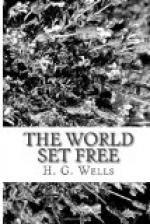‘At first,’ he says, ’I was extraordinarily excited by my baptism of fire. Then as the heat of the day came on I experienced an enormous tedium and discomfort. The flies became extremely troublesome, and my little grave of a rifle pit was invaded by ants. I could not get up or move about, for some one in the trees had got a mark on me. I kept thinking of the dead Prussian down among the corn, and of the bitter outcries of my own man. Damned foolery! It was damned foolery. But who was to blame? How had we got to this? . . .
’Early in the afternoon an aeroplane tried to dislodge us with dynamite bombs, but she was hit by bullets once or twice, and suddenly dived down over beyond the trees.
’"From Holland to the Alps this day,” I thought, “there must be crouching and lying between half and a million of men, trying to inflict irreparable damage upon one another. The thing is idiotic to the pitch of impossibility. It is a dream. Presently I shall wake up.” . . .
’Then the phrase changed itself in my mind. “Presently mankind will wake up.”
’I lay speculating just how many thousands of men there were among these hundreds of thousands, whose spirits were in rebellion against all these ancient traditions of flag and empire. Weren’t we, perhaps, already in the throes of the last crisis, in that darkest moment of a nightmare’s horror before the sleeper will endure no more of it—and wakes?
’I don’t know how my speculations ended. I think they were not so much ended as distracted by the distant thudding of the guns that were opening fire at long range upon Namur.’
Section 7
But as yet Barnet had seen no more than the mildest beginnings of modern warfare. So far he had taken part only in a little shooting. The bayonet attack by which the advanced line was broken was made at a place called Croix Rouge, more than twenty miles away, and that night under cover of the darkness the rifle pits were abandoned and he got his company away without further loss.
His regiment fell back unpressed behind the fortified lines between Namur and Sedan, entrained at a station called Mettet, and was sent northward by Antwerp and Rotterdam to Haarlem. Hence they marched into North Holland. It was only after the march into Holland that he began to realise the monstrous and catastrophic nature of the struggle in which he was playing his undistinguished part.
He describes very pleasantly the journey through the hills and open land of Brabant, the repeated crossing of arms of the Rhine, and the change from the undulating scenery of Belgium to the flat, rich meadows, the sunlit dyke roads, and the countless windmills of the Dutch levels. In those days there was unbroken land from Alkmaar and Leiden to the Dollart. Three great provinces, South Holland, North Holland, and Zuiderzeeland, reclaimed at various times between the early tenth century and 1945 and all many feet




